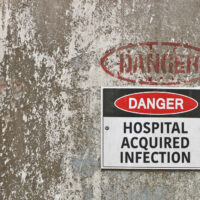What You Need to Know about Hospital-Based Infections

When you or your loved one is in the hospital due to a major illness or surgery, your focus is on recovering from that condition. You assume that your treating physicians and nurses will take every possible precaution not to spread infection from other patients, and to follow good practices regarding wound care to minimize infection risk. Unfortunately, this is not always the case. Every year across the US, hundreds of thousands of hospital patients develop serious infections as the result of their hospitalizations, and many are killed by these infections. Learn more about hospital-acquired infections, and the ways they can be prevented, below.
Staggering number of hospital patients infected every year
The Centers for Disease Control and Prevention (CDC) reports that about one in every 25 hospital patients will suffer from a healthcare-associated infection. This amounts to some 650,000 individuals who are made sick as the result of their time in the hospital. Of those, about 75,000 individuals will die as the result of the infection they received while undergoing treatment for an unrelated condition.
Hospital-acquired infections are unlike the types of bugs that you or your family members are likely to catch at home or school. These infections are far more likely to result in severe illness and additionally be resistant to traditional means of treatment. One example of an infection commonly transferred in hospitals is C. Difficile, or C. Diff. This is a bacterial infection which causes serious gastrointestinal problems such as severe diarrhea. C. Diff is fatal in about 14,000 instances every year. Another example is Methicillin-resistant Staphylococcus Aureus, known as MRSA. This is a staph infection which is not treatable with traditional antibiotics, and it can be fatal in some instances.
How can these infections be prevented?
Hospitals are obligated to have procedures in place that prevent as much spread of disease as possible. When doctors and nurses fail to adhere to established good practices regarding the prevention of infection, a hospital may be liable for the resulting illness or death suffered by the patient. For example, medical personnel must rigorously wash their hands in between patient visits to prevent contamination. Wounds should be bandaged with surgical glue whenever possible, which can keep out a greater share of contaminants than can traditional bandages. Doctors should remove IVs and catheters as early as possible, as the insertion site provides yet another open wound where infection can enter the body. If you are in the hospital with a loved one, ensure that these practices are being followed by the treating medical personnel to prevent the spread of deadly disease.
If you or someone you love has been injured by a hospital-acquired infection, find out if you have a claim for money damages based on these injuries by contacting the knowledgeable, seasoned, and effective Hudson Valley medical malpractice lawyers at Rusk, Wadlin, Heppner & Martuscello, LLP for a consultation, in Kingston at 845-331-4100, and in Marlboro at 845-236-4411.
